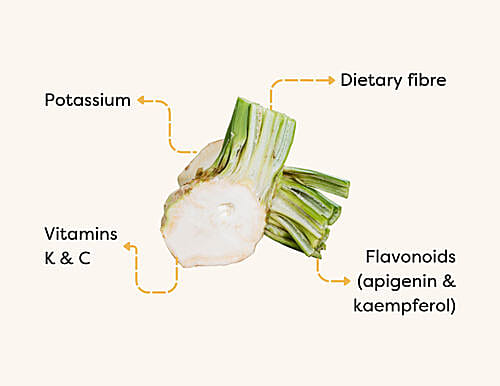Celeriac: Health benefits, nutritional values & how to enjoy
29th Feb 2024
It might not be the most appealing vegetable but don’t judge a root by its cover. Celeriac is full of fibre, potassium and flavonoids, a nutrient-rich addition to your plate.
Key points
Source of
Celeriac is a nutrient-packed root vegetable that adds flavour and valuable plant compounds to your meals.
- Fibre – Supports gut health by improving digestive function and increasing gut microbiota diversity.
- Flavonoids, such as apigenin and kaempferol – Plant compounds with antioxidant and anti-inflammatory properties.
- Potassium – Helps maintain normal blood pressure and supports overall heart health.
- Vitamin K and C

Health benefits
- Cancer prevention? Apigenin is a type of plant flavone that has caught the eye of many researchers due to its numerous valuable properties, including antioxidant, anti-inflammatory, and anticancer effects. Research found that a higher intake of apigenin and other flavonoids was linked to a reduced risk of certain cancers. You can also find it in chamomile, parsley and artichokes.
- A quality carb option – Celeriac is a root vegetable that gives you carbs with extra benefits. While potatoes contain 1.8 grams of fibre, celeriac takes the lead with 3.7 grams per 100 grams, making it a great addition to your carb sources.
More to come: A few trials are looking at celery extract but we need more studies on celeriac specifically to uncover its full range of health benefits.
5 ways to enjoy
Celeriac’s subtle nutty flavour, like a mix of celery and parsley, makes it super versatile. It soaks up other flavours beautifully in soups, stews and casseroles.
- Raw in salads – Slice or grate it for a creamy coleslaw or to add some oomph to your salad.
- Breakfast hash – Peel the celeriac, dice it into cubes and sauté it with spices. Serve it up with leafy greens and eggs or beans.
- Purée – Boil and mash it with other root vegetables to give a twist to your classic potato mash. Pair it with baked fish or a hearty mushroom stew.
- Pickled – Cut it into thin batons and soak in vinegar and spices.
- Soups & stews – Toss it into lentil or bean stews and soups alongside other root veggies for added depth and flavour.
References/sources
- Access over 800 research backed recipes
- Personalise food for your unique health needs
